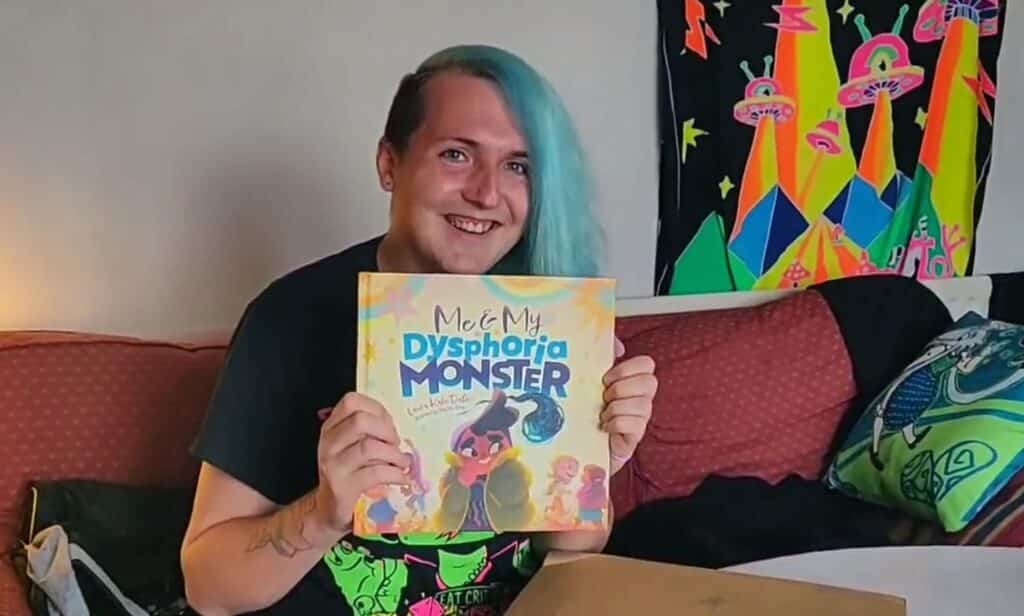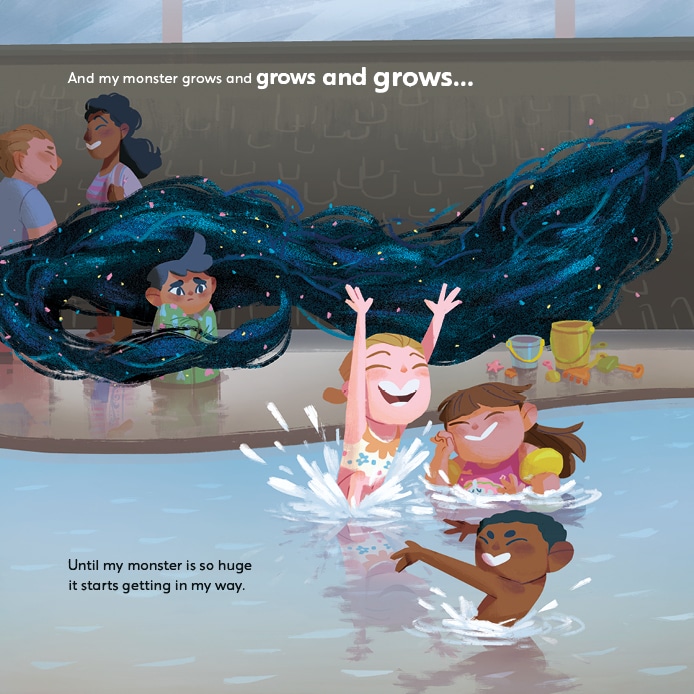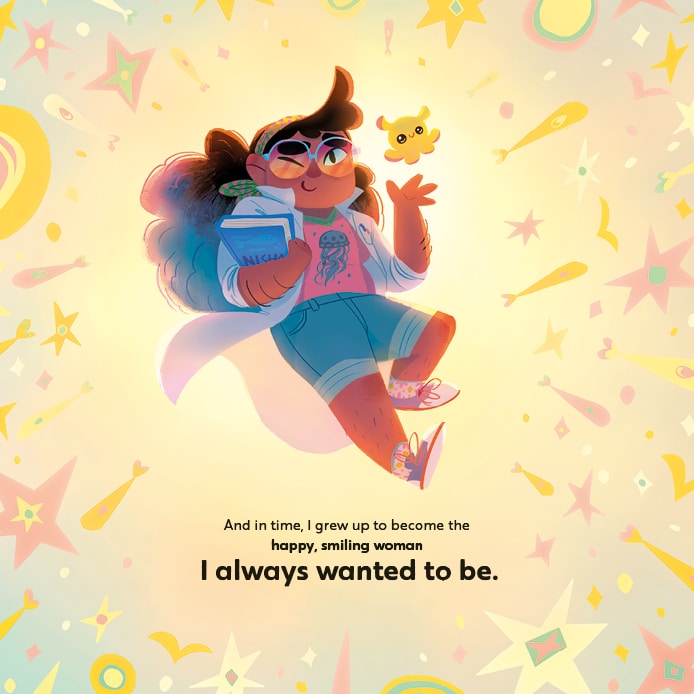Heartwarming children’s book teaches trans kids how to overcome the ‘gender dysphoria monster’

Laura Kate Dale created an illustrated children’s book about the trans experience to help kids find resources and words to describe their experience. (Provided)
A new children’s book teaches young trans people that there’s nothing “monstrous” about who they are.
Me and My Dysphoria Monster follows the journey of Nisha, a young girl who lives with a nebulous monster following her around.
As Nisha’s monster grows, her world shrinks. She feels isolated, cut off from her loved ones and like the colour has been drained out of everything around her.
The monster grows when people call Nisha a boy or use a boy’s name for her, until eventually the once small creature blots out everything in her life.
But one day, Nisha meets Jack, a trans man who also has a monster, and he explains that being able to live as his authentic self shrank his “gender dysphoria monster”.
The young trans girl – empowered by this information – opens up about her identity, and the once all-encompassing gender dysphoria monster shrinks so she can live a vibrant life once more.
Author Laura Kate Dale tells PinkNews that the metaphor is an incredibly personal one.
“I didn’t get to see trans people presented as people with interior lives who were experiencing what I was experiencing,” Dale says of her youth.
“All I got to see growing up in the early ’90s was trans people represented as monsters or punch lines. It made me feel like I was a monster.”

Laura Kate Dale felt “monstrous” about her trans identity because of a lack of resources and positive representation about the community growing up. (Provided)
Dale felt isolated without any positive trans representation and a general “lack of understanding” about the community at the time.
“Externalising it as this monstrous, nameless thing that is scary – because if I acknowledge that it’s there, I acknowledge there is something monstrous that’s a part of me – that’s a really difficult feeling to grow up with.
“I needed stories that showed I wasn’t alone in the interior thoughts I was having about myself and, if I followed those thoughts to their natural conclusion, there was hope for me being a happy, well-adjusted, positive adult.”
Laura found her way, but she wants to make things easier for the next generation.
Me and My Dysphoria Monster is aimed at young trans people, their parents and their peers.

Laura Kate Dale says it was important for her to create a book with “child-accessible language to talk about the internal experience of being a dysphoric trans person”. (Provided)
It’s designed a “a resource that has child-accessible language to talk about the internal experience of being a dysphoric trans person”, but also serves as “an adult’s resource so parents can read up in more detail about the kinds of things that you don’t have time to go over during a children’s narrative”.
Importantly, it can also teach cisgender youth why it’s “important to be respectful” and empathetic of another person’s journey.
In the book, the “small actions” of others eventually affirm Nisha’s identity and help the “all-consuming clouds of emotion” lift away – leaving her feeling there are “fewer barriers” in her life. This mirrors Dale’s own experience of coming out.
“I was 18 at the time, but my mum, looking back, describes how I lit up as a person,” she says. “I flourished socially in a way I hadn’t done before, I seemed a lot more alive and that sort of physical lifting and brightness is something I think is just better portrayed with images than it is with words alone.”

Laura Kate Dale says people who “fear-monger” about the trans community do so because “they know they’re ultimately losing this battle”. (Provided)
Dale is painfully aware of the climate she’s releasing the book into, with both the UK and the US seeing the “rumblings of banning discussion of trans identities”.
But she wants people to see “behind all of the posturing, dramatic headlines and fear-mongering” being whipped up about what is, in essence, a “tiny fragment” of society that just wants to live.
“At the end of the day, all we are is people who didn’t feel happy with ourselves and found simple, basic changes that were immeasurably helpful to us being happier, healthier, more positive people,” she says.
“The people that fear-monger about our existence do so because they know they’re ultimately losing this battle.
“The reason you’re seeing so many vicious, anti-trans headlines and pushes against the trans community is because, if you look at the demographics, trans people are being more widely accepted as younger generations grow up.
“It is a matter of time before trans acceptance becomes the norm, and what you’re witnessing is the angry, misleading screams of a community that is desperately trying to cling onto power because they know their days where their bigotry is acceptable [are] numbered.”

